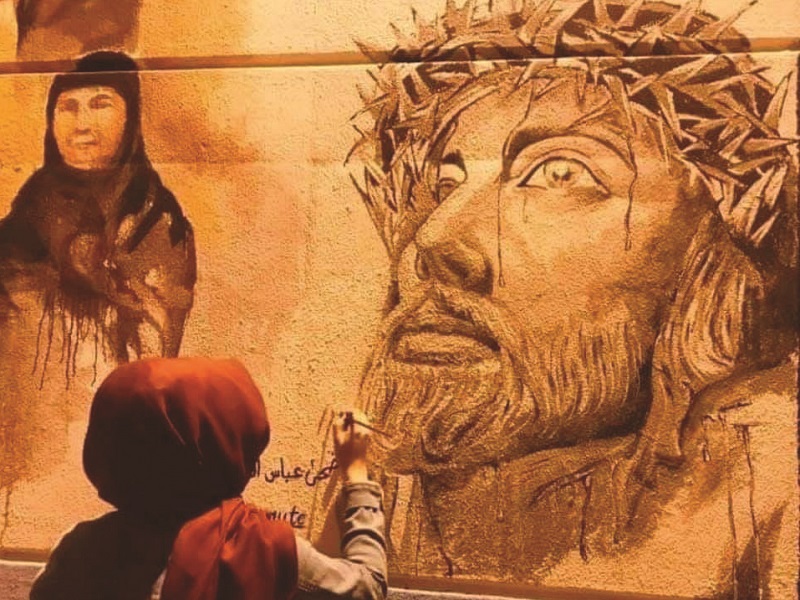Written in Graffiti

02/01/2020 Washington D.C. (International Christian Concern) – Iraq is not the same country as it was six years ago. Remnants of past wars are visible on every street, but young Iraqis are calling for a future of peace and religious diversity.
Last fall, millennials created the most significant protest movement in Iraq’s history. Raised in a country of war, their lives were defined by sectarian violence. They had enough of the war and violence–and soon the rest of the country joined in the call for religious diversity and peace.
The public is frustrated at neighboring countries’ involvement in Iraq. They are angry about the Turkish airstrikes in Sinjar and about the Iranian influence in Christian areas.
In Baghdad, their frustrations have been painted onto the city’s numerous cement blast walls. Originally erected to minimize the impact of explosives and war vehicles, the wall became a blank slate where the people voiced their hope via graffiti.
Their graffiti speaks of the nation’s longing for community and healing. The government, though, has responded with harsh violence.
In a desperate attempt to catch the attention of foreigners, the graffiti is in Arabic and English.
One wall cried out to the world, “Where are you?”
Another pleaded with the government, “Stop killing.”
For Iraqi Christians, these protests are unlike anything they’ve ever experienced. The government and its agents tried to eliminate Christianity from Iraq using violence, but the protests made it clear that Iraqis want a future of religious diversity.
During the protests, Islamic leaders joined hands with Christians, and Muslims held signs proclaiming the Gospel.
“You can’t imagine how the protests bring hope back to Christians,” marveled one Baghdad resident.
Hope brought Christians like Salwan onto the streets with the protesters. Six years ago, he lost his home when ISIS invaded. “The day we fled Qeraqosh was the hardest day I passed through,” he said at the time.
ICC provided Salwan with an inexpensive taxi to help him earn a living in Baghdad. Taxi drivers have been the heroes of the recent protests. When the government shot peaceful protesters, taxi drivers rushed the wounded away. Salwan enthusiastically participated, not realizing how much this would personally impact him.
According to Salwan, the violence against the protesters by the government and its parties included a “brutal response [against] unarmed civilians who carried nothing but flags, and were shouting for peace.”
He told local reporters, “[But] everyone was respectful, and that was extremely surprising. Everyone was trying to save his/her brother from the guns and tear gas, regardless of their religion.”
Salwan’s brother, Stevan, was one of the rescued. A soldier shot Stevan through the neck with a tear gas canister. His life was saved by strangers who brought him to safety. It made Stevan eager to resume protesting. He told us, “I was at the frontlines with people who resisted the tear gas shootings. The feeling was terrible and exciting at the same time. The feeling of being responsible, protecting others. As a Christian, I was proud, defending others.” Other believers felt the same way.
“I am with the protesters because I want to live in a country where I can plan for a future, a country which gives people rights. But I am sad for all the people who have been killed,” added another Christian protester.
“I see a young generation [of Muslims and Christians] doing their best to change the current situation,” voiced another. “I am with the protesters and support them against the Islamic parties.”
The soul of Iraq has changed. However, the question that the protesters have posed to the rest of the world remains: Where are you?
To read more stories like this, sign up for ICC’s free monthly magazine.
For interviews, please email press@persecution.org
